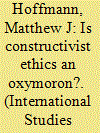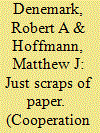|
|
|
Sort Order |
|
|
|
Items / Page
|
|
|
|
|
|
|
| Srl | Item |
| 1 |
ID:
124080


|
|
|
|
|
| Publication |
2013.
|
| Summary/Abstract |
Following the recent 150th anniversary of the publication of The Origin of Species, we are in the midst of a surge of Darwinian models of social change in international relations and even genetic and sociobiological analyses of politics more generally. But does being correct biologically make the Darwin/Mendel synthesis an appropriate model of change in world politics? This is an open question and one made interesting by the existence of multiple discarded models of biological evolution, most prominent among them being Lamarck's model of inheritance of acquired characteristics. So we can also ask, conversely, does being incorrect biologically disqualify a model for use in international relations? In this article, we explore this question by examining the challenges of evolutionary analysis and analyzing Lamarckian evolution side by side with Darwinian evolution. If IR is to pursue evolutionary analysis, we argue that Lamarck deserves a second look.
|
|
|
|
|
|
|
|
|
|
|
|
|
|
|
|
| 2 |
ID:
089258


|
|
|
|
|
| Publication |
2009.
|
| Summary/Abstract |
Constructivism is often invoked in calls for a turn toward ethics in the practice of International Relations scholarship. Yet, while constructivists rely on norms and ethical ideas in their explanations of world politics, the theory or approach actually fails spectacularly in providing fundamental notions about what is right or ethical in world politics. In this article I interrogate the paradox that, while constructivists provide a prominent place for morals and ethics in their explanations of world politics, constructivism is agnostic on what those morals and ethics should be. I then inquire into the source of ethics in international relations theory more generally, arguing that the ethical commitments of international relations theories are found in the theories' basic assumptions. Finding a fundamental qualitative difference between constructivism and other international relations theories relative to core assumptions, I discuss what constructivist ethics consists of and I turn inward to reflect on the ramifications of the discussion for personal ethics for a constructivist
|
|
|
|
|
|
|
|
|
|
|
|
|
|
|
|
| 3 |
ID:
082692


|
|
|
|
|
| Publication |
2008.
|
| Summary/Abstract |
Despite its importance in the global system, the literature provides little guidance on how treaty-making emerged as a well-accepted practice. In either assuming the appropriateness of treaty-making (and then analysing design) or treating treaties as strategic choices in the pursuit of gains (without analysing how treaties came to be a way to pursue gains), the current literature discounts the emergence and evolution of treaty-making. This lacuna contributes to a biased view of treaty-making as the epiphenomenal result of specific, ahistorical factors, rather than as a patterned, historical practice. We contend that the evolution of the practice of treaty-making is significant for questions of design/compliance, the future of multilateral interaction and global order. In addressing this concern, we pursue two linked goals. The first is self-consciously descriptive. We introduce a dataset of multilateral treaties that provides a novel picture of treaty-making across time, space and issue-areas. The second goal is explanatory. We develop and test a social constructivist and path-dependent explanation for the patterns of treaty-making evident in the data, especially 150 years of exponential growth, the spread of treaty-making across multiple issues and the diffusion of the practice across the world.
|
|
|
|
|
|
|
|
|
|
|
|
|
|
|
|
|
|
|
|
|